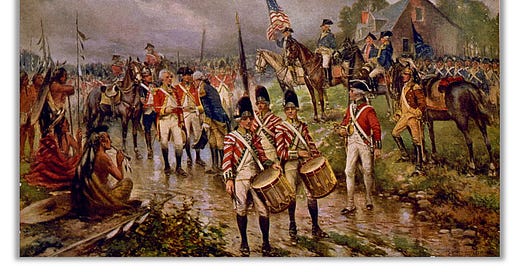TDIH: Victory at Saratoga
British officers later spoke of the “courage and obstinacy with which the Americans fought.” One American officer noted that colonists had “Something more at Stake than fighting for six Pence Pr Day.”
On this day in 1777, the second Battle of Saratoga is fought. The American victory was the beginning of the end for British General John Burgoyne. Perhaps more importantly, we demonstrated to the world that we could hold our own, even against the powerful British army.
We’d earn support from other nations as a result.
Burgoyne surely never saw it coming. He had a specific mission in America: He was to travel from Canada down to Albany in an attempt to separate the New England colonies from the southern ones. Many British hoped that such a move would break the back of the American Revolution.
Burgoyne started off well, with an easy capture of Ft. Ticonderoga. But things went downhill from there. He was delayed by Americans who intentionally destroyed bridges or blocked roads. He lost many men when a detachment of his army was defeated at the Battle of Bennington—and the first Battle of Saratoga at Freeman’s Farm hurt him still more. Technically, that was a British victory against the Americans then being led by Horatio Gates. But Burgoyne lost twice as many men as Gates did, and he failed to drive Americans from their fortified position on Bemis Heights.
The Americans had been fighting hard that day. British officers would later speak of the “courage and obstinacy with which the Americans fought.” Another eyewitness would write that famed rifleman Daniel Morgan “was in his glory” as “he astonished the English and Germans with the deadly fire of his rifles.” One American officer would note, quite simply, that the colonists had “Something more at Stake than fighting for six Pence Pr Day.”
Needless to say, the British didn’t win much of a victory. And things would just get worse from there.
Burgoyne’s army was dwindling in size, even as Gates’s army was growing larger. Militia were pouring in every day, buoyed by news of the strong American showing at Freeman’s Farm.
Burgoyne was in a bind. Expected reinforcements had not shown up. His advisors urged him to retreat, but he refused. On October 7, he sent a “reconnaissance-in-force” of 2,000 men, armed with cannons, toward the Americans. A scout notified Gates, who dispatched two brigades, along with Daniel Morgan’s riflemen. One American officer later described Morgan’s attack: “True to his purpose, Morgan at this critical moment poured down like a torrent from the hill, and attacked the right of the enemy in front and flank.”
The British were soon retreating toward their redoubts. It was at about this time that Benedict Arnold became a hero in the battle, although historians differ on exactly what happened.
Some historians say that Gates had stripped him of his command before the battle commenced, but that Arnold—perhaps fueled by alcohol—let his emotions get the best of him and charged in anyway. Others argue that Arnold was commanding forces all along, but that he went on the offensive when Gates had intended for him to simply maintain a defensive posture. Either way, in large part because of Arnold, the Americans gained possession of a British redoubt at a critical moment. Arnold took a blow to his leg at the end of the battle. It would take him months to recover.
By the end of the day, the British were in full retreat, but Burgoyne’s humiliation was not yet complete. He would soon surrender his forces, changing the course of the American Revolution.
Naturally, that is a story for another day.
Sources can always be found on my website, here.





An unbelievable battle that made our country viable!
😄❤️🇺🇸🇺🇸🇺🇸🇺🇸🇺🇸🇺🇸
Thank you Tara. The second battle of Saratoga broke the back of the British and the writing was on the wall. As you describe, the Colonists had much more to lose than the British and that was a great motivator.